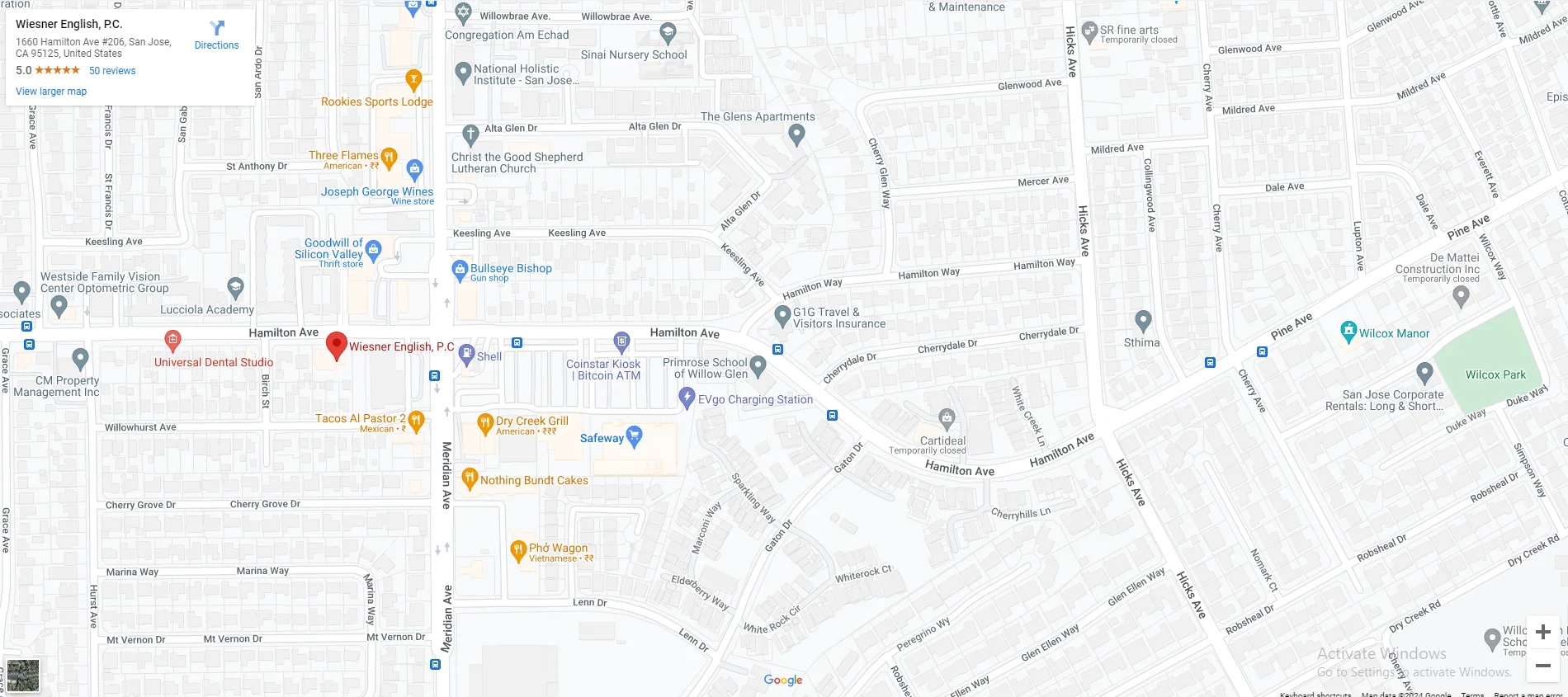San Jose Workers’ Compensation Lawyer

San Jose, CA Workers’ Compensation Attorney
Workplace injuries can happen suddenly, often with life-changing consequences. Many work environments across various industries present workers with risks to their immediate and long-term safety. Despite this unfortunate reality, workers have a right to a safe workplace and are protected with certain benefits if an accident occurs. To obtain these benefits, it’s highly recommended to hire a San Jose workers’ compensation lawyer.
The workers’ compensation system is in place to protect both employees and employers in California in the event of a workplace injury. If you have suffered an injury while at work, it is important that you speak with a San Jose workers’ compensation lawyer at Wiesner English, P.C., as soon as possible.
Workers’ Compensation Representation in San Jose, CA
The attorneys at Wiesner English, P.C., have dedicated their entire practice to fighting for the rights of injured workers. Our team has helped workers across many industries, including manufacturing, government, construction, licensed professionals, restaurants, service industries, and small businesses. We understand the stress that can be caused by workers’ compensation cases and work diligently to uphold each of our client’s rights.
Offering an initial free claim consultation, our team offers comprehensive legal services and counsel, including any litigation, trial, or appeals representation, as warranted, that may become necessary.
The skilled and experienced representation offered by a San Jose workers’ comp lawyer can help ensure you receive a fair and full settlement amount that includes the maximum benefits legally allowed.
What Is Workers’ Compensation?
When a workplace accident occurs or when an employee otherwise discovers an illness or injury arising from the performance of work-related tasks, the employee is entitled to particular benefits through their employer’s compensation insurance company, known as workers’ compensation.
These benefits may offer the employee compensation for damages suffered while protecting the employer from liability. In California, all employers are required by law to carry this insurance for their employees. In turn, all claims to recover damages are handled through the compensation process rather than through a personal injury or other tort law claim.
What Are Common Workplace Injuries Covered by Workers’ Compensation?
Workers suffer a qualifying injury when their health or well-being is directly adversely affected by their work. This includes injuries sustained while simply at a place of work or workplace injuries sustained while performing work-related duties. In most cases, this is the result of an accident that occurs, but there are also injuries that slowly build, manifesting over time. The most common injuries fall under the following general categories:
- Slip and fall accidents. The Occupational Safety and Health Administration (OSHA) lists fall accidents as the number one workplace accident type reported each year. Falls also account for the highest number of missed days and the most fatalities. Wet floors, obstructed paths, and uneven flooring create unsafe environments, and ladders, platforms, risers, and other climbing apparatuses feature risks for falls.Falling accidents can lead to serious injuries, such as broken bones, traumatic brain injuries, and strained muscles.
- Vehicle accidents. Many industries employ work vehicles or drivers as a regular part of operations. Drivers, such as delivery drivers, mail truck drivers, big rig and semi-truck drivers, and transportation drivers, are constantly at risk for traffic accidents. Auto accidents remain the number one cause of serious injury in California for workers and commuters alike.If you are injured in a vehicle accident, there may be additional parties who bear fault in the accident, presenting the opportunity to pursue an additional claim. Vehicle accidents can lead to both minor and serious injuries, including fractures, sprains, contusions, minor headaches, and, in more serious cases, head trauma, spinal cord injuries, paralysis, and lost limbs.
- Equipment accidents. Workplaces of all kinds utilize various machinery, tools, and industry-specific equipment. Most often, these potentially dangerous machines require proper training to use. Nevertheless, workers operating or around operating forklifts, cranes, saws, hydraulic presses, excavators, and other potentially dangerous equipment are at risk for serious injury.Equipment accidents can lead to crush injuries, impalement, fractures, lacerations, amputations, and fatalities.
- Repetitive strain injuries. Some injuries are the result of long-term strain or exposure, particularly through repetitive motions, that take years to manifest. Those who bend frequently, repeatedly lift heavy objects, or otherwise perform the same movements every day, such as stocking shelves or typing at a keyboard, are at risk for long-term injury.Repetitive strain injuries include tendonitis, bursitis, carpal tunnel syndrome, and other peripheral nerve entrapment disorders.
- Other work-related conditions. There are many other potential harms workers face in the workplace, including exposure to dangerous chemicals or hazardous materials, work-related illnesses, diseases, and mental and emotional harm, such as anxiety and depression.
While many injuries are apparent, many others are difficult to quantify, especially if they did not manifest immediately. For this reason, it is extremely helpful to have an experienced and skilled attorney with a proper understanding of how to present documentation that demonstrates a full list of your injuries to the workers’ compensation insurance company.
What Does Workers’ Compensation Cover?
After filling out a workers’ compensation claim with your employer’s insurance company, you may be entitled to benefits intended to cover qualifying expenses and losses that you incurred either in the workplace or performing work-related duties. Provided there are no issues during the review phase, your claim may include some manner of the following compensating items:
- Medical care expenses. Subject to the California Labor Code, an employer’s insurance carrier may cover medical expenses, bills, and follow-up costs for past, present, and future expenses. This includes hospitalizations, surgery, exams, medication, and follow-up care, such as physical therapy, prescriptions, and subsequent surgeries or other medical procedures.
- Lost wages. Workplace injuries often leave employees unable to return to work for days, months, or even years. Some injuries can even leave individuals permanently unable to return to the same work capacity. Workers’ comp may cover a portion of this lost income or lost future earning capacity that resulted from the injury.
- Funeral costs. In cases of wrongful death, where a workplace accident or injury leads to the death of an employee, their surviving dependents (e.g., family members or other loved ones) can file for workers’ compensation on their behalf to collect reimbursement of the death benefits as defined by the Labor Code. In addition to medical expenses and lost wages, a wrongful death workers’ comp claim could cover funeral costs, interment fees, and casket or cremation costs.
What Are My Rights Under Workers’ Compensation in California?
Workers’ compensation in California is a no-fault system, meaning it is not necessary to establish or prove fault in order to receive an award. Personal injury claims and other cases of intentional tort require individuals to prove negligence or other means of fault in order to secure a settlement award from a judge as a means of recovery.
Workers are protected from any negative or retaliatory action taken against them by their employer as a result of filing. California state laws prohibit employers from punishing employees for filing a valid claim in good faith and prevent them from discouraging employees from filing at all. This means that, legally, the employer cannot retaliate against the injured worker for a reason related to filing a workers’ compensation claim, including actions such as:
- Demoted
- Terminated
- Docked pay
- Subjected to unwarranted disciplinary action
If you have been injured or made ill in your workplace or by conducting work-related tasks, you are entitled to submit a claim for compensation through your employer’s workers’ compensation insurance. You should be legally free to do so without fear of retaliation.
If, for any reason, you suspect you are being discouraged from filing a valid claim or are experiencing subsequent unfair treatment after filing, partner with a qualified and experienced attorney who can uphold your rights.
How Long Can You Be on Workers Comp in California?
The duration for every individual workers’ comp claim will vary according to the details of each unique case. The severity of the injury sustained and its impact on the employee’s life and ability to return to work will be direct factors in how long the benefit will be offered.
Generally, workers will be entitled to up to two years, or 104 weeks, of temporary disability. Longer-term benefits are available for those with further needs through permanent disability, which is offered in some cases to those who are unable to recover fully or ever return to work in the same capacity.
Can I Sue My Employer for a Workplace Injury?
While workers’ compensation laws protect injured workers from having to bear the burden of proof of wrongdoing in order to pursue compensation for their injuries, those same laws also protect employers from liability in the event of a workplace accident. This means that most often (outside of limited exceptions), employers cannot be sued or have legal action taken against them due to a work-related injury. Rather, California law requires injured workers to go through workers’ compensation as the exclusive legal remedy.
However, if the employer committed a violation such as below, this may negate the legal restriction and allow the employee to pursue a personal injury claim against the employer. This would be the case if the employer:
- Intentionally caused the injury
- Injured or harmed you in a manner outside of an employer relationship context
- Concealed the injury or hid the company’s role in the accident
- Did not carry valid and current workers’ compensation insurance when required by law
If your employer was guilty of any of these or other potentially qualifying violations, you could opt instead to pursue a personal injury claim against them. Doing so, however, would place the burden of proof on you to demonstrate wrongdoing. If you believe your employer has committed an actionable offense, it is highly recommended you work with a qualified attorney.
Can I Sue if Another Party Was at Fault?
Many workplace accident injuries are the direct result of negligence. When you’ve suffered an injury, and the fault lies with someone other than yourself, you may be entitled to enhance your workers’ comp claim with additional recovery through a personal injury claim against an at-fault party.
For example, if you are a driver who was struck by another vehicle, you could take legal action against the at-fault driver. Additionally, if you were injured in an accident involving work equipment, and the machinery was being operated in an irresponsible or improper manner, you could hold the negligent coworker legally responsible for your injury.
If you were injured in a work-related accident due to the negligence of a third party, inquire with your workers’ comp attorney to discuss additional claim options in your case.
How Much Do Workers Comp Lawyers Charge in California?
Generally, workers comp lawyers in California charge a contingency fee for their services, meaning that they will collect a portion of the settlement as payment after the compensation is awarded. The attorneys at Wiesner English, P.C., work on a purely contingent basis. This means:
- There are no up-front costs.
- No deposit is required.
- There is no need for a retainer payment.
The contingency fee rate will be discussed upfront so there are no surprises. Our goal is to encourage everyone to seek legal help as needed and eliminate any financial barriers to receiving experienced and skilled legal guidance and care.
Your San Jose Workers’ Compensation Representation
By choosing to partner with one of our injury attorneys at Wiesner English, P.C., you can be provided with comprehensive legal guidance and advocacy from a knowledgeable and experienced team. We fight on behalf of every client to secure the most favorable outcome by pursuing the maximum legally allowed compensation available.
If you’ve suffered damages, such as injury or illness, while performing work-related activities, it is imperative that you consider seeking immediate medical attention and consider informing your supervisor. Then, contact our office for a consultation to discuss the details of your case and receive a recommendation on how to proceed.
Request A
Free Consultation
Fields marked with an * are required





